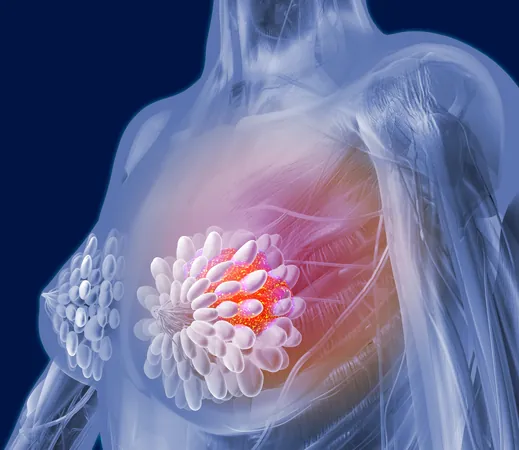
Shocking Discovery: Omega-6 Fatty Acids Fuel Triple-Negative Breast Cancer Growth!
2025-04-02
Author: Ming
Groundbreaking Study Unveils Omega-6 Link to TNBC
A groundbreaking study from Weill Cornell Medicine has unveiled a startling connection between omega-6 linoleic acid—an everyday fatty acid found in popular seed oils and animal products—and the aggressive growth of triple-negative breast cancer (TNBC). Published in the prestigious journal Science, this research indicates a previously unknown mechanism by which omega-6 linoleic acid activates key cancer growth pathways, particularly through its interaction with a protein known as FABP5, which is notably present in TNBC but absent in other breast cancer types.
Lead researcher Dr. John Blenis stated, 'This finding clarifies the complex relationship between dietary fats and cancer, and paves the way for personalized nutritional strategies that might benefit specific patient groups.' Indeed, understanding how omega-6 can exacerbate cancer growth may guide dietary recommendations for those at risk.
Omega-6 Fatty Acids and Their Risks
Omega-6 fatty acids are essential for various functions in the body but have been associated with an increased risk of several cancers, notably breast cancer. The typical Western diet, rich in processed foods and seed oils, heightens the intake of these fatty acids. Previous studies on their effects have yielded mixed results; however, this research is the first to clarify a biological mechanism that links omega-6 linoleic acid to cancer progression.
The Focus on Triple-Negative Breast Cancer
The team particularly honed in on TNBC, an aggressive breast cancer category that is devoid of estrogen, progesterone, and HER2 receptors, making it notoriously resistant to conventional therapies. Their experiments revealed that linoleic acid activates the mTORC1 pathway, a crucial regulator for cell growth and metabolism. This activation hinges on the fatty acid’s ability to bind with FABP5, which is produced in elevated levels in TNBC cells.
'By forming a complex with FABP5, linoleic acid activates mTORC1, spurring tumor cell growth,' the researchers explained. Their animal studies added weight to these findings, demonstrating that a diet high in linoleic acid increased FABP5 levels, mTORC1 activity, and subsequent tumor growth in the tested mice.
Preclinical Insights
Employing various preclinical models, including breast cancer cell lines and patient-derived xenografts (PDX), the research team confirmed that linoleic acid selectively activated the mTORC1 pathway in triple-negative cells, avoiding other hormone-sensitive subtypes. Notably, newly diagnosed TNBC patients exhibited high FABP5 levels in both tumors and blood samples, suggesting a direct link with disease progression.
Implications for Cancer Treatment
The implications of this research are profound for cancer treatment strategies. The presence of FABP5 may indicate which TNBC patients could benefit from targeted nutritional changes or pharmacological treatments aimed at disrupting the omega-6-mTORC1 signaling pathway. 'Future dietary studies might consider grouping patients by their FABP5 expression and TNBC status,' they remarked. Moreover, these findings propose that reducing dietary omega-6 intake could help manage or potentially slow TNBC progression in select patients.
Broader Investigations
Interestingly, ongoing investigations are also probing the broader implications of omega-6 fatty acids in other health conditions. Early results hint at the FABP5-mTORC1 signaling pathway's involvement in various cancer types, including certain prostate cancers, as well as common chronic diseases like obesity and diabetes.
This study not only uncovers a potentially wrenching impact of dietary choices on cancer growth but also holds the promise of redefining dietary guidelines for cancer patients in the future. For those concerned about cancer risk, this research underscores the importance of monitoring omega-6 fatty acid intake in the quest for improved health outcomes. Stay tuned for more updates as scientists continue to peel back the layers of dietary influences on cancer!




 Brasil (PT)
Brasil (PT)
 Canada (EN)
Canada (EN)
 Chile (ES)
Chile (ES)
 Česko (CS)
Česko (CS)
 대한민국 (KO)
대한민국 (KO)
 España (ES)
España (ES)
 France (FR)
France (FR)
 Hong Kong (EN)
Hong Kong (EN)
 Italia (IT)
Italia (IT)
 日本 (JA)
日本 (JA)
 Magyarország (HU)
Magyarország (HU)
 Norge (NO)
Norge (NO)
 Polska (PL)
Polska (PL)
 Schweiz (DE)
Schweiz (DE)
 Singapore (EN)
Singapore (EN)
 Sverige (SV)
Sverige (SV)
 Suomi (FI)
Suomi (FI)
 Türkiye (TR)
Türkiye (TR)
 الإمارات العربية المتحدة (AR)
الإمارات العربية المتحدة (AR)